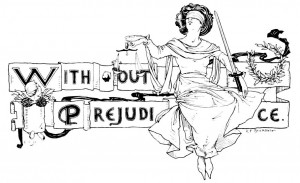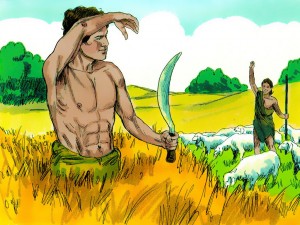[This was first posted on April 22, 2012; reposted August 19, 2014. Revisiting on the occasion of the birth anniversary of the author’s brother who was brutally murdered by 7 strangers who by this time, have served their jail time of 17 years and are out on parole. His family’s unresolved question: has justice truly been served?
Check out:
Translations: AST/ArtScroll Tanach; EF/Everett Fox The Five Books of Moses.—Admin1.]
——————————
Poor Cain, the firstborn of Adam and Eve.
- Was he the first victim of his parents’ “original sin”?
- Did he have a choice to be different from the way he turned out, the first fratricide?
- Does “original sin” really make all descendants of the first parents hopelessly unable to rise above their inherited fallen nature?
- Are all mankind predestined to damnation?
- If that is so, then why was Abel “commended righteous”?
- And Seth, to whose good lineage some key biblical figures like Noah are traced?
Upon revisiting Kayin/Cain, this time without the taint of inherited “original sin” in the picture, a few things emerge.
For one, Cain was a tiller of the soil while Abel was a keeper of flock. Which occupation would you think is the more difficult one?
Remember the curse upon Adam:
Genesis/Bereshith 3:17-19To Adam he said;
Because you have hearkened to the voice of your wife and have eaten from the tree about which I commanded you, saying:
You are not to eat from it!
Damned be the soil on your account,
with painstaking-labor shall you eat from it, all the day of your life.
18 Thorn and sting-shrub let it spring up for you,
when you (seek to) eat the plants of the field!
19 By the sweat of your brow shall you eat bread,
until you return to the soil,
for from it you were taken.
For you are dust, and to dust shall you return.
In effect, for Kayin/Cain to make an offering out of the sweat of his brow, he would have to till the ground, plant, wait for crops to grow, harvest, and bring the fruits of his hard labor as an offering to God. That’s a lot of backbreaking work compared to the idyllic pastoral setting for a shepherd like Hevel/Abel who probably had it easy while on the job—he could rest a lot, play the flute, write psalms, while his flock is in pasture. Poor-sighted sheep [or so we are told] have keen ears that recognize the call of only their shepherd; Hevel/Abel just has to lead the way like the Pied Piper and the flock follows. At least that’s the image in our minds when we read Psalm 23.
The Christian teaching on Cain and Abel emphasizes the acceptability of Abel’s offering:
“By faith Abel offered to God a more acceptable sacrifice than Cain, through which he was commended as righteous, God commending him by accepting his gifts. And through his faith, though he died, he still speaks.”[Hebrews 11:4].
The word “sacrifice” is used in the NT book of Hebrews because it fits the whole teaching on the shedding of blood for the forgiveness of sins.
In the Hebrew (not Christian) translation however, another word is used:
[AST] 3 In the course of time, Cain brought an offering to HASHEM of the fruit of the ground; 5 and as for Abel, he also brought of the firstlings of his flock and from their choicest. HASHEM turned to Abel and to his offering, 5 but to Cain and to his offering He did not turn. This annoyed Cain exceedingly, and his countenance fell.
And for one more rendering:
[ET] 3 Now it was, after the passing of days
that Kayin brought, from the fruit of the soil, a gift to YHWH,
4 and as for Hevel, he too brought—from the firstborn of his flock, form their fat-parts.
YHWH had regard for Hevel and his gift,
5 for Kayin and his gift he had no regard.
Kayin became exceedingly upset and his face fell.

- Image from wwyeshua.wordpress.com
A “sacrifice” suggests having to comply with an actual or imagined divine demand., including the act of slaughtering an animal. An “offering” suggests simply surrendering a possession, just like giving a ‘gift’. In the prescribed offerings at the Temple, bloodless offerings were allowed such as flour and oil, monetary equivalent such as the shekel:
Leviticus/Waiyqrah 5:11-16
[AST] 11 But if his means are insufficient for two turtledoves or for two young doves then he shall bring, as his guilt-offering for that which he sinned, a tenth-ephah of fine flour for a sin-offering; he shall not place oil on it nor shall he put frankincense on it, for it is a sin-offering. 12 He shall bring it to the Kohen, and the Kohen shall scoop from it his freefingersful as its memorial portion and cause it to go up in smoke on the Altar, on the fires of HASHEM; it is a sin-offering. 13 The Kohen shall provide him atonement for the sin that he committed regarding any of these, and it will be forgiven him; and it shall belong to the Kohen, like the meal offering. 14 HASHEM spoke to Moses, saying: 15 If a person commits treachery and sins unintentionally against HASHEM’s holies, he shall bring his guilt-offering to HASHEM, an unblemished ram from the flock, with a value of silver shekels, acording to the sacred shekel, for a guilt-offering. 16 For what he has deprived the Sanctuary he shall make restitution, and add a fifth to it, and give it to the Kohen; then the Kohen shall provide him atonement with the ram of the guilt-offering an it shall be forgiven him.
[EF] 11 Now if his hand cannot reach two turtledoves or two young pigeons,
he is to bring as his near-offering (for) what he sinned a tenth of an efa or flour, for a hattat-offering;
he hs not to put on it (any) oil, he is ot to place on it (any) frankincense,
for it is a hattat-offering.
12 He is to bring it to the priest,
the priest is to scoop out with his fist a fistful of some of it, as a reminder-portion,
and is to turn it into smoke on the slaughter-site, along with the fire-offerings of YHWH,
it is a hattat-offering.
13 So the priest is to effect-purgation for him for his sin whereby he sinned, in (any) one of these,
and he shall be granted-pardon.
And it shall be for the priest, like the grain-gift.
14 YHWH spoke to Moshe, saying:
15 A person-when he breaks-faith, yes, faith, sinning in error regarding any of the holy-things of YHWH,
he is to bring as his asham/penalty to YHWH: a ram, wholly-sound, from the flock,
by your assessment in silver shekels by the Holy Shrine shekel, as an asham.
16 For that whereby he sinned regarding the holy-things, he is to pay, and its fifth he is to add to it, giving it tot he priest;
then the priest is to effect purgation on his behalf with the ram of asham,
and he shall be granted-pardon.
[There are many other similar verses in Exodus, Leviticus and Numbers].
What was wrong with Cain’s offering was not that it was bloodless. Although the text does not specify, perhaps it simply was not the best of his produce and in addition, his attitude was not right. But if Cain had worked so hard compared to Abel, would he not be justified in feeling dejected? Of course he could learn from God’s favorable reaction toward Abel’s offering. He could resolve to do better next time, offer only the choicest of his crops. He had a choice to react properly.
Did God immediately condemn Cain? On the contrary, just as God issued warnings to Adam and Eve before they chose to disobey, He teaches Cain just like a caring father would.
Genesis/Bereshith 4:6-7
[AST] Why are you annoyed, and why has your countenance fallen? 7 Surely, if you improve yourself, you will be forgiven. But if you do not improve yourself, sin rests at the door. Its desire is toward you yet you can conquer it.
[EF] YHWH said to Kayin:
Why are you so upset? Why has your face fallen?
7 Is it not thus: If you intend good, bear-it-aloft,
but if you do not intend good, at the entrance is sin, a crouching-demon,
toward you his lust—
but you can rule over him.
Imagine, God Himself says to Cain that he has the ability to rule over sin when Cain had not yet sinned. Does that sound like Cain was doomed to commit sin because of a fallen nature he had nothing to do with and simply inherited? Cain has free will and can make a choice between doing right and not doing right. Unfortunately, Cain makes the wrong choice:
Genesis/Bereshith 4 :8-14
[AST] 8 Cain spoke with his brother Abel. And it happened when they were in the field, that Cain rose up against his brother Abel and killed him. 9 HASHEM said to Cain, “Where is Abel your brother?” And he said, “I do not know. Am I my brother’s keeper?” 10 Then He said, “What have you done? The voice of your brother’s blood cries out to Me from the ground! 11 Therefore you are cursed more than the ground, which opened wide its mouth to receive your brother’s blood from your hand. 12 When you work the ground, ti shall no longer yield its strength to you. You shall become a vagrant and a wanderer on earth.” 13 Cain said to HASHEM, “Is my iniquity too great to be borne? 14 Behold, You have banished me this day from the face of the earth—can I be hidden from Your presence? I must become a vagrant and a wanderer on earth; whoever meets me will kill me!”[EF] 8 Kayin said to Hevel his brother . . .
But then it was, when they were out in the field
that Kayin rose up against Hevel his brother
and he killed him.
9 YHWH said to Kayin:
Where is Hevel your brother?
He said:
I do not know. Am I the watcher of my brother?
10 He said:
What have you done!
A sound—your brother’s blood cries out to me from the soil!
11 And now,
damned be you from the soil,
which opened up its mouth to receive your brother’s blood from your hand.
12 When you wish to work the soil
it will not henceforth give its strength to you;
wavering an wandering must you be on earth!
13 Kayin said to YHWH:
My iniquity is too great to be borne!
14 Here, you drive me away today from the face of the soil,
and from your face must I conceal myself,
I must be wavering and wandering on earth–
now it willl be that whoever comes upon me will kill me!
God ‘s merciful response to Cain goes as far as protecting him from harm:
4:15-16
[AST] 15. HASHEM said to him, “Therefore, whoever slays Cain, before seven generations have passed he will be punished.” And HASHEM placed a mark on Cain, so that none that meet him will kill him. 16 Cain left the presence of HASHEM and settled in the land of Nod, east of Eden.
[EF] 15 YHWH said to him:
No, therefore, whoever kills Kayin, sevenfold will it be avenged!
So YHWH set a sign for Kayin,
so that whoever came upon him would not strike him down,
16 Kayin went out from the face of YHWH
and settled in the land of Nod/Wandering, east of Eden.
Why did God spare Cain’s life? Is not the taking of a human life condemnable, and most specially when the victim is one’s own blood-brother? Perhaps it is because the 6th commandment had not yet been given as law. Mankind had yet to be taught right from wrong; Torah had yet to be given as the standard that would govern man’s relationship toward man.
Poor Cain might not have been told that he was indeed his brother’s keeper or, if he was told, he did not listen, or if he did, he did not heed.
So . . . yes Cain, to answer the question “Am I my brother’s keeper?” Torah is much about being that to one’s kin, the neighbor, the stranger, and specially the underprivileged in society.
NSB@S6K





Postscript: From TORAH THROUGH TIME, by Shai Cherry:
“God was simply trying to teach Cain the lesson that the two [Divine justice vs. human injustice] are easily confused in a world graced by free will. People don’t always get what they deserve. If you read only the ending of our story, you might conclude that Abel’s death was a sign of Divine disfavor. We should remember, however, that God’s regard for Abel did not even protect him from his own brother. The converse is not true. It is seductive to imagine that our success is a sign of Divine favor. Do not identify the victor with the virtuous, or the vanquished with the wicked. Such simplistic reductionism is a vulgar perversion of God’s role in history.